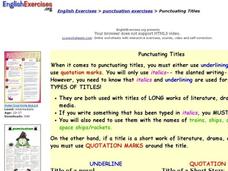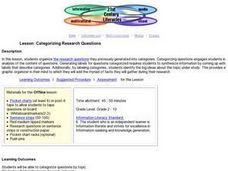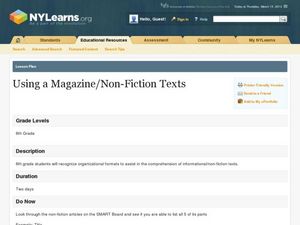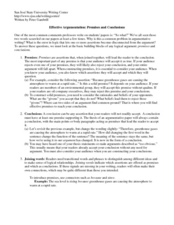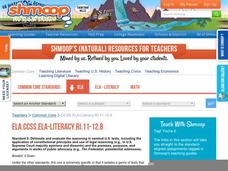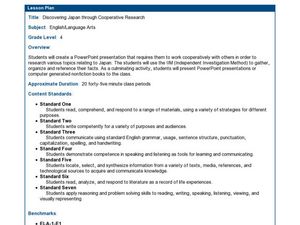Curated OER
Can you Follow Me? Conventions
Use the present tense to create written assignments. Critical thinkers take a passage written in past or future tense and rewrite it in present tense. They then write a set of instructions in present tense.
Curated OER
Visible Speech: What is a Sentence?
Use this straightforward presentation as a basic guide to your grammar unit. With explanations of the parts of a simple sentence (subject, verb, direct object), the slideshow is a good way to reinforce students' prior knowledge about...
Curated OER
Joyful Noise: Poems for Two Voices by Paul Fleischman
Do your young readers know that poems can be performed as a team? They listen to a few examples from Paul Fleischman's book Joyful Noise: Poems for Two Voices, paying attention to how the how readers work together. They examine the...
Curated OER
Anno's Magic Seeds
Read a tale for your class as they unravel patterns presented in the story using manipulatives. Pause to allow time for discussion and explanation of solutions throughout the story. They write equations or expressions with order of...
Curated OER
Those Baffling Bibliographies!
Are you working on a research and citation unit? Have your young writers listen to a lecture on how to cite research sources correctly and how to distinguish new information that requires citing. They compile a list of works cited from...
Curated OER
ESL: Punctuating Titles
When are titles underlined, italicized, or placed in quotation marks? Take your class to the computer lab to give them some independent practice. Here they read through the information, examples, and explanations provided. They then...
Curated OER
Latin Tutorial 1: Multiple-Choice Item Writing for Teachers
What are the benefits to providing your learners with multiple-choice questions on quizzes and tests? If you'll be teaching Latin literature this year, read this quick argument to decide which types of questions you'll create.
Curated OER
Hands-On Outlining
In order to write an effective outline, children must be able to identify main ideas and supporting details, which is the aim of this fun and kinesthetic activity. The class works on the floor to organize sentence strips prepared by the...
Curated OER
Categorizing Research Questions
Show learners of all ages the necessary steps to solid research. Before even looking at a computer screen, they need to generate research questions or topics. They then work together to categorize all of the proposed topics. This process...
Curated OER
Native American Crafts Worksheet
Deepen understanding of Native American craftspeople through biography and research. For this essay project, learners sift through online biographies about Native Americans in Louisiana. After looking through the given resources,...
Curated OER
Using a Magazine/Non-Fiction Texts
Working with magazine articles and other informational texts, students identify the parts of a non-fiction work. The learners use SMART board files to guide instruction, as well as a transition to writing their own non-fiction article in...
San José State University
Effective Argumentation: Premises and Conclusions
Augment argumentative skills with this handout and brief exercise. This resource outlines premises, conclusions, and joining words, and explains how these make up the foundation of logical arguments. After reading through this...
Curated OER
Email Buddies
Collaborate with another class (or school) and have your learners share ideas about their reading through the use of email. Perhaps you'll create a specific question or a few questions for writers to choose from. Not only will they...
Shmoop
ELA.CCSS.ELA-Literacy.RI.11-12.8
It is no easy feat to wade through legal and political documents. And incorporating this type of informational text into a literature class can also be a challenge. Here’s a resource that includes suggestions for how to address this...
Curated OER
Write to the Author
Students orally present information about a favorite book to their classmates. They construct pop-up cards that depict a character in the author's book and include a question for the author written from the point of view of the character.
EngageNY
End of Unit 2 Assessment: Working with Two Texts - Reading, Listening, Summarizing, and Synthesizing
As a summative assessment for this unit on colonial trade, fourth graders listen to and read informational texts in order to demonstrate their ability to take notes, write summaries, and draw connections. Young scholars first listen as...
Curated OER
Discovering Saturn, The Real "Lord of the Rings"
Reading, writing, and rings! A lesson from NASA combines space science with authentic reading and writing tasks. Included in this lesson are pre-reading activities, four mini informational booklets on Saturn, a structured note-taking...
Curated OER
The Legendary Raptors
How are raptors and airplanes alike? Combine science and language arts in this fun and interactive project. Young scientists research the animal in order to design their own aircraft, and compete in a contest for farthest, fastest, and...
Curated OER
Discovering Japan Through Cooperative Research
Search a variety of sources to create a multimedia or book project about Japan. Learners use the independent investigation method to plan and conduct research about Japan. They use the information they discover to create a computer book...
Curated OER
Picture This
Elementary writers practice writing descriptive paragraphs by adding adjectives and sensory words to their writing. They use a picture of a monster for their descriptive paragraph. This 12-page lesson should increase your charges...
Curated OER
Best Websites for English Teachers
Bookmark these grammar, writing, and literature websites to build your teaching arsenal, making life just a little bit easier.
Curated OER
My Insect Report
Is your class writing a report on insects? If they are, you have to check out this great set of worksheets. It provides a well-scaffolded system they can use to organize their research findings in order to compose a well-structured...
Curated OER
Lights! Cameras! Action!: Creating a Drama About the Lyme Art Colony
Discuss the lives of artists in the Lyme Art Colony in the 1900s with this resource. Young historians write and perform a short scene depicting individuals who lived in the Griswold boardinghouse, used by the colony artists. They use the...
Curated OER
Can Scientists Discover a Limit to Discovery?
Is there anything left to discover? Evaluate opposing sides of the debate regarding whether or not there is a future for scientific discovery. Middle and high schoolers assess quotations from the articles included to evaluate claims and...







